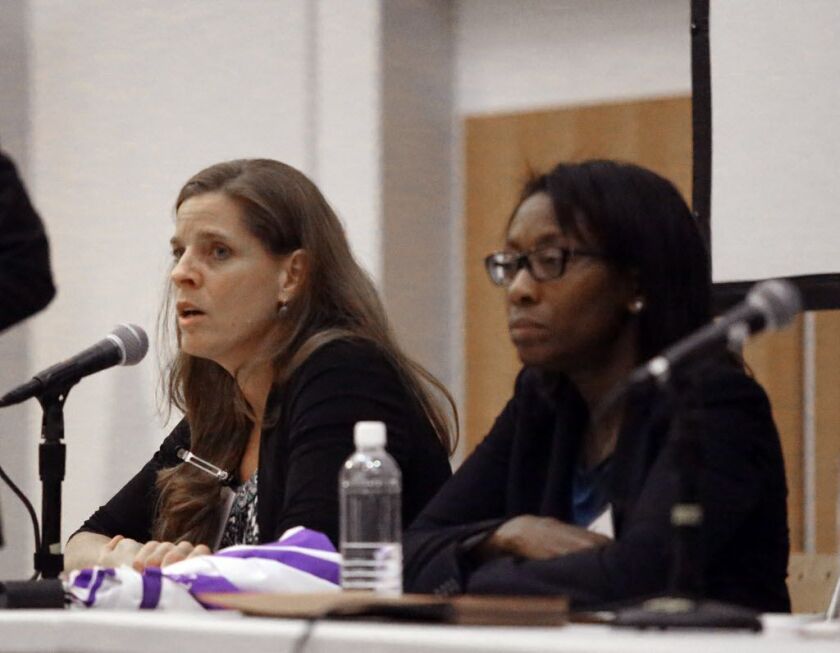Protesters on Wednesday repeatedly shouted down members of the Justice Department team investigating civil rights violations by the Chicago Police Department during a raucous public hearing on the South Side.
During a 90-minute meeting at Kennedy King College, Justice Department attorneys were at pains to explain the scope and potential impact of the probe of the Chicago Police that began six months ago, over jeers from about half the members of an audience of about 100 people. The meeting was the second of four planned by federal investigators as they prepare a report on the Chicago Police Department, a likely prelude to a court order that will mandate federal oversight of the city’s police.
Minutes into the meeting, a handful of demonstrators hooted over Justice Department attorney Cynthia Coe as she tried to explain how the federal investigation could lead to sweeping reforms. In a bid to restore order, moderator Rev. Torrey Barrett grudgingly began a question-and-answer session.
“You come into a room and tell us that ‘this is how it’s going to be,’” complained community activist Marlon Chamberlain to the panel of eight federal lawyers, expressing frustration with the meeting format and decades of thwarted attempts to reform policing in Chicago.
“Why should we put faith in this process when we’ve seen this happen over and over … and nothing has changed.”
Those who took the microphone over the next hour were a varied group, at least in terms of the volume of their outrage: a mother who became an activist after her son was killed; a white, retired Chicago Police officer who said even his complaint against an officer was ignored; a frequent protester who said he was “jumped” by police; a half-dozen men who said they had been wrongfully stopped, arrested and even injured by white officers; a woman who sang her observations on Chicago crime, and refused to turn over the microphone.
Christy Lopez, deputy chief of special litigation in the Justice Department’s Civil Rights Division, said the team was the largest ever assembled since 1994, when federal legislation gave the federal department authority to investigate civil rights violations by police agencies, and Chicago is the largest department ever subject to a probe.
Lopez explained that while the investigation began only days after the city released video of the Laquan McDonald shooting, her team’s investigation would not end with criminal charges against officers for individual shootings — a separate investigation into the Chicago Police officer who shot McDonald is ongoing— while Lopez’s team focuses on systemic problems with the Chicago Police.
So far, Coe said in her abbreviated catalog, investigators have contacted more than 400 residents who have made complaints or statements online or to a phone hotline, talked to members of 80 community organizations, visited all 22 police districts, and met with 150 police officers and 34 IPRA investigators.
Lopez said the investigation, into both the Chicago Police Department and the Independent Police Review Authority, would take another six months at least. Once the report findings are finalized in a report, the federal government could negotiate an agreement mandating sweeping reforms of the department, as it has in cities from Pittsburgh to Los Angeles.

Christy Lopez, of the Department of Justice Civil Rights, responds to comments made during the public forum to discuss the investigation into the Chicago Police Dept. by the U.S. Dept. of Justice Civil Rights Division and the U.S. Attorney’s office as Cynthia Coe, attorney for the Department of Justice Civil Rights Division, looks on at Kennedy King College in Chicago Wednesday, June 22, 2016. | Kevin Tanaka/For the Sun-Times
Different from previous reform efforts over the decades undertaken in the wake of police scandals, when the Justice Department makes its findings, a federal judge can enforce terms of the agreement.
“It takes years to implement one of these agreements. We’re not going to solve all these problems in a matter of months,” Lopez said, noting that the Justice Department recently took over control of the jail in New Orleans after repeated failures by the sheriff there to live up to terms of a federal decree. “There are very strong remedies in these agreements to make sure they are followed.”
Many in the audience still seemed unimpressed.
“Chicago Police Department is a racist department,” shouted one woman. “There is no court order that can erase racism. Defund Chicago Police Department … and we will patrol our own communities.”
The Justice Department team will hold two more public meetings in July: A 6:30 p.m., Tuesday, July 12
at Truman City College, 1145 W. Wilson Ave. and at 6:30 p.m., on Wednesday, July 14 at
KROC Center, 1250 W. 119th St.





